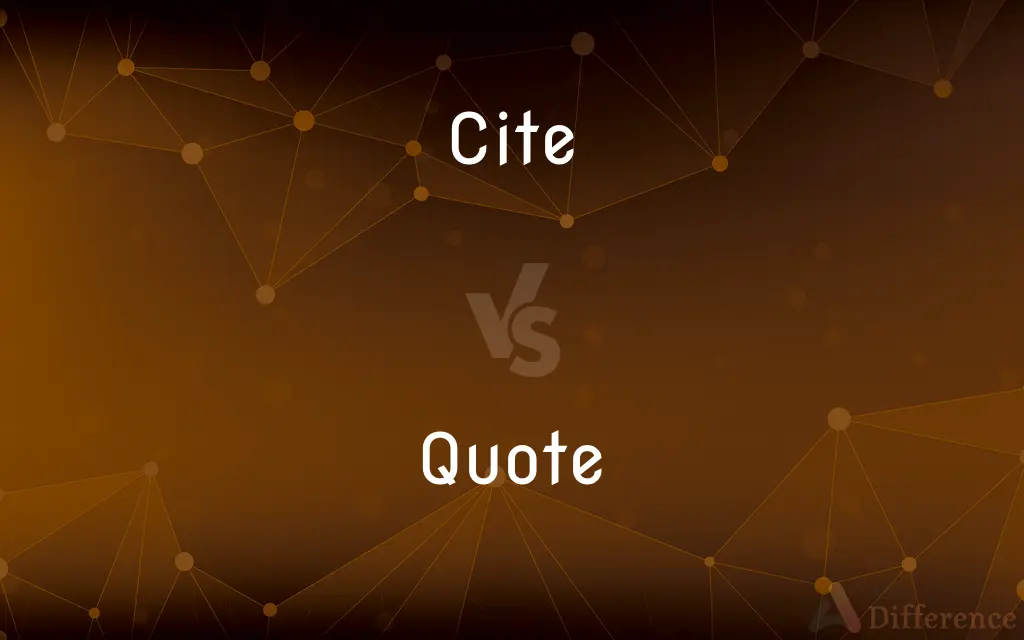Cite vs. Quote — What's the Difference?
Edited by Tayyaba Rehman — By Fiza Rafique — Updated on May 18, 2024
Cite refers to referencing a source, while quote involves directly using someone else's exact words.

Difference Between Cite and Quote
Table of Contents
ADVERTISEMENT
Key Differences
Cite means to refer to a source, giving credit to the original author of an idea, statement, or piece of information. This can be done in various formats such as APA, MLA, or Chicago style, depending on the academic or professional context. Quote, on the other hand, involves directly copying and using the exact words from a source. When quoting, the text must be enclosed in quotation marks and properly attributed to the original author.
Citing often involves summarizing or paraphrasing information from a source and then providing a reference to that source. This allows writers to incorporate external information while maintaining their own voice and perspective. Quoting, however, requires verbatim reproduction of the text, preserving the original wording and meaning, which is particularly useful when the specific language of the source is significant.
When you cite a source, you acknowledge its contribution to your work, typically including details like the author’s name, publication year, and page number. This helps readers locate the original source if they wish to explore it further. Quoting also includes these details but focuses on presenting the exact phrasing used by the original author, ensuring accuracy and credibility in the presentation of evidence or arguments.
Citing can be more flexible, allowing you to interpret and integrate the source material into your own narrative. Quoting is more rigid, as it necessitates the precise inclusion of another's words, which can be beneficial for supporting an argument with authoritative evidence.
In academic writing, both citing and quoting are essential for avoiding plagiarism. Citing provides a broader context by acknowledging the influence of various sources, while quoting emphasizes particular statements or passages that are especially relevant or eloquent.
ADVERTISEMENT
Comparison Chart
Definition
Referencing a source
Using exact words from a source
Usage
Summarizing or paraphrasing information
Directly copying text
Format
Various citation styles (APA, MLA, etc.)
Quotation marks and attribution
Flexibility
Allows interpretation and integration
Requires precise reproduction
Purpose
Acknowledge source influence
Provide authoritative evidence
Avoiding Plagiarism
General acknowledgment
Specific acknowledgment of wording
Compare with Definitions
Cite
To mention as evidence for or justification of an argument.
The report cites recent data on climate change.
Quote
To enclose a passage in quotation marks.
When you quote, always use quotation marks.
Cite
To reference a source in your work.
Please cite all the sources you used in your research paper.
Quote
To provide an exact statement from a source.
She quoted the expert’s opinion in her article.
Cite
To give credit to the original author or work.
She cited several studies to support her argument.
Quote
Repeat or copy out (words from a text or speech written or spoken by another person)
He quoted from the scriptures
I realized she was quoting passages from Shakespeare
Cite
To call upon officially or authoritatively.
He was cited for his contributions to the field of medicine.
Quote
Give someone (the estimated price of a job or service)
A garage quoted him £30
Cite
Refer to (a passage, book, or author) as evidence for or justification of an argument or statement, especially in a scholarly work
Authors who are highly regarded by their peers tend to be cited
He does not cite any source for this assertion
Quote
Give (a company) a quotation or listing on a stock exchange
A British conglomerate quoted on the London Stock Exchange
Cite
Praise (someone, typically a member of the armed forces) in an official report for a courageous act
He has been cited many times for his contributions in the intelligence area
Quote
A quotation from a text or speech
A quote from Wordsworth
Cite
Summon (someone) to appear in court
The writ cited only four of the signatories of the petition
Quote
A quotation giving the estimated cost for a particular job or service
Quotes from different insurance companies
Cite
A citation.
Quote
A quotation or listing of a company on a stock exchange.
Cite
To quote or refer to (a book or author, for example) as an authority or example in making an argument.
Quote
Quotation marks
Use double quotes around precise phrases you wish to search for
Cite
(Law) To refer to (a previous court decision or other legal precedent), as when arguing a case.
Quote
To repeat or copy (words from a source such as a book), usually with acknowledgment of the source
Quoted lines from Shakespeare in his lecture.
Cite
To mention or bring forward as support, illustration, or proof
Cited several instances of insubordinate behavior.
Quote
To repeat or copy the words of (a person or a book or other source)
Likes to quote Shakespeare when giving advice.
Cite
To commend officially for meritorious action in military service.
Quote
To cite or refer to for illustration or proof
Quoted statistics to show she was right.
Cite
To honor formally.
Quote
To repeat a brief passage or excerpt from
The saxophonist quoted a Duke Ellington melody in his solo.
Cite
To issue a notice of violation to
Was cited by the police for jaywalking.
Quote
To state (a price) for securities, goods, or services.
Cite
To make reference to a previous court decision. Often used with to
The lower court cited to the Supreme Court decision issued last year.
Quote
To give a quotation, as from a book.
Cite
A citation or quotation.
Quote
A quotation.
Cite
To quote; to repeat, as a passage from a book, or the words of another.
Quote
A quotation mark.
Cite
To list the source(s) from which one took information, words or literary or verbal context.
Quote
Used by a speaker to indicate the beginning of a direct quotation
"He paused and said, quote, I don't care, unquote.".
Cite
To summon officially or authoritatively to appear in court.
Quote
A dictum; a saying.
Cite
(informal) a citation
We used the number of cites as a rough measure of the significance of each published paper.
Quote
A quotation; a statement attributed to a person.
Cite
To call upon officially or authoritatively to appear, as before a court; to summon.
The cited dead,Of all past ages, to the general doomShall hasten.
Cited by finger of God.
Quote
A quotation mark.
Cite
To urge; to enjoin.
Quote
A summary of work to be done with a set price.
After going over the hefty quotes, the board decided it was cheaper to have the project executed by its own staff.
Cite
To quote; to repeat, as a passage from a book, or the words of another.
The devil can cite Scripture for his purpose.
Quote
A price set for a financial security or commodity.
Cite
To refer to or specify, as for support, proof, illustration, or confirmation.
The imperfections which you have cited.
Quote
(transitive) To repeat (the exact words of a person).
The writer quoted the president's speech.
Cite
To bespeak; to indicate.
Aged honor cites a virtuous youth.
Quote
(transitive) To prepare a summary of work to be done and set a price.
Cite
To notify of a proceeding in court.
Quote
To name the current price, notably of a financial security.
Cite
Make reference to;
His name was mentioned in connection with the invention
Quote
(intransitive) To indicate verbally or by equivalent means the start of a quotation.
Cite
Commend;
He was cited for his outstanding achievements
Quote
(archaic) To observe, to take account of.
Cite
Refer to;
He referenced his colleagues' work
Quote
To cite, as a passage from some author; to name, repeat, or adduce, as a passage from an author or speaker, by way of authority or illustration; as, to quote a passage from Homer.
Cite
Repeat a passage from;
He quoted the Bible to her
Quote
To cite a passage from; to name as the authority for a statement or an opinion; as, to quote Shakespeare.
Cite
Refer to for illustration or proof;
He said he could quote several instances of this behavior
Quote
To name the current price of.
Cite
Advance evidence for
Quote
To notice; to observe; to examine.
Cite
Call in an official matter, such as to attend court
Quote
To set down, as in writing.
Cite
To refer to a legal case or statute.
The lawyer cited precedent to support her case.
Quote
A note upon an author.
Quote
A punctuation mark used to attribute the enclosed text to someone else
Quote
A passage or expression that is quoted or cited
Quote
Repeat a passage from;
He quoted the Bible to her
Quote
Name the price of;
Quote prices for cars
Quote
Refer to for illustration or proof;
He said he could quote several instances of this behavior
Quote
Put quote marks around;
Here the author is quoting his colleague
Quote
To repeat someone else's words exactly.
He quoted Shakespeare in his speech.
Quote
To cite a price or figure.
The contractor quoted a price for the renovation.
Quote
To mention a specific person or source as evidence.
He quoted a famous scientist to back his claims.
Common Curiosities
What is the purpose of citing a source?
Citing acknowledges the contribution of other works and helps avoid plagiarism.
What does it mean to quote a source?
To quote a source means to use the exact words from the original text, enclosed in quotation marks.
What formats are used for citing sources?
Common formats include APA, MLA, and Chicago styles.
When should you use a quote?
Use a quote when the original wording is significant or authoritative.
What does it mean to cite a source?
To cite a source means to reference it in your work, giving credit to the original author.
How do you cite a source in-text?
In-text citation usually includes the author's last name and publication year.
Can quotes be modified?
Minor changes for clarity or grammar are allowed, but significant changes should be indicated with brackets or ellipses.
How do you format a quote?
Enclose the quoted text in quotation marks and attribute it to the original author.
What is the difference between paraphrasing and quoting?
Paraphrasing involves restating information in your own words, while quoting uses the exact words from the source.
Can you cite without quoting?
Yes, you can cite sources without directly quoting them by paraphrasing their ideas.
What information is typically included in a citation?
A citation usually includes the author's name, publication year, title, and page number.
Why is citing important in academic writing?
Citing is crucial for giving credit to original authors and avoiding plagiarism.
How do you integrate a quote into your writing?
Introduce the quote with a signal phrase and follow it with an in-text citation.
What is a block quote?
A block quote is a longer quotation formatted as a separate block of text, typically used for quotes longer than four lines.
How do you avoid plagiarism when using sources?
Avoid plagiarism by properly citing all sources and using quotes for exact wording.
Share Your Discovery

Previous Comparison
Network vs. Platform
Next Comparison
Vesicle vs. PapuleAuthor Spotlight
Written by
Fiza RafiqueFiza Rafique is a skilled content writer at AskDifference.com, where she meticulously refines and enhances written pieces. Drawing from her vast editorial expertise, Fiza ensures clarity, accuracy, and precision in every article. Passionate about language, she continually seeks to elevate the quality of content for readers worldwide.
Edited by
Tayyaba RehmanTayyaba Rehman is a distinguished writer, currently serving as a primary contributor to askdifference.com. As a researcher in semantics and etymology, Tayyaba's passion for the complexity of languages and their distinctions has found a perfect home on the platform. Tayyaba delves into the intricacies of language, distinguishing between commonly confused words and phrases, thereby providing clarity for readers worldwide.














































